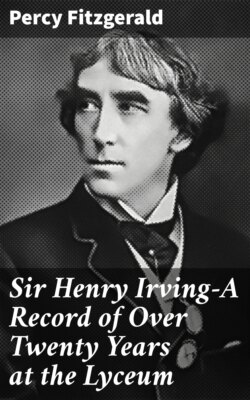Читать книгу Sir Henry Irving—A Record of Over Twenty Years at the Lyceum - Fitzgerald Percy Hetherington - Страница 3
На сайте Литреса книга снята с продажи.
PREFACE.
ОглавлениеTable of Contents
One attraction in the life of an actor who has fought his way, and triumphed over many difficulties, in his struggles to eminence, is found in the spirit of adventure which nearly always marks his course. Such a story must be always gratifying and encouraging to read; and we follow it now with sympathy, now with admiration. Nor is it without gratification for the actor himself, who must look back with complacency to troubles surmounted, and to habits of patience and discipline acquired. In this severe and trying school he may acquire the practical virtues of resignation, courage, perseverance, and the art of confronting difficulties. Even at the present moment, when the stage is presumed to be more flourishing than at any former period, the element of precariousness is more present than ever. Everything seems a lottery—theatres, pieces, actors. A theatre has gained a high reputation with one or two successful pieces: of a sudden the newest play fails—or “falls,” as the French have it—to be succeeded by another, and yet another: each failing or “falling,” and seeming to prove that, if nothing succeeds like success, nothing fails like failure.
There is a spectacle often witnessed in the manufacturing counties, when we may be standing waiting in one of the great stations, which leaves a melancholy impression. A huge theatrical train containing one of the travelling companies comes up and thunders through. Here is the “Pullman Car,” in which the performers are seen playing cards, or chatting, or lunching. They have their pets with them—parrots, dogs, etc. It suggests luxury and prosperity. But this ease is dearly purchased, for we know that the performer has bound himself in a sort of slavery, and has consented to forego all the legitimate methods of learning his profession. He belongs to some peripatetic company, a “travelling” one, or to one of the innumerable bands who take round a single play, for years, it may be; and in it he must play his single character over and over again. Hence, he must learn—nay, is compelled to play—every character in the same fashion, for he knows no other method. His wage is modest, but constant; but he can never rise higher, and if he lose his place it will be difficult for him to find another. It will be interesting to see what a contrast this system offers to the course of our cultured actors, who have endured the iron training and discipline of the old school; and in this view we shall follow the adventurous career of the popular Henry Irving, admittedly the foremost of our performers. In his instance we shall see how the struggle, so manfully sustained, became an invariable discipline, slowly forming the character which has made him an interesting figure on which the eyes of his countrymen rest with pleasure: and developing, as I have said, the heroic qualities of patience, resolution, and perseverance.
At the same time, I do not profess to set forth in these pages what is called “a biography” of the actor. But this seems a fitting moment for presenting a review of his artistic, laborious work at the Lyceum Theatre, during a period of over twenty years. Having known the actor from the very commencement of his career; having seen him in all his characters; having written contemporaneous criticisms of these performances—I may be thought to be at least fairly qualified for undertaking such a task. I possess, moreover, a vast collection of what may be called pièces justificatifs, which includes almost everything that has been written of him. It will be seen that the tone adopted is an independent one, and I have freely and fairly discussed Sir Henry Irving’s merits, both real and imputed. Where praise is undiscriminating, there is no praise. I have also dealt with many interesting “open questions,” as they may be called, connected with theatrical management and the “art of the stage.” I may add that in this new edition I have added many particulars which will be found interesting, and have brought the story down to the present moment.
Athenæum Club,
July, 1895.
